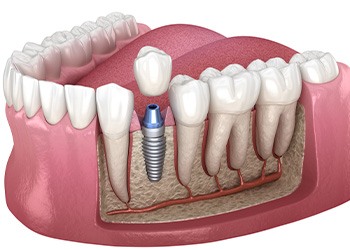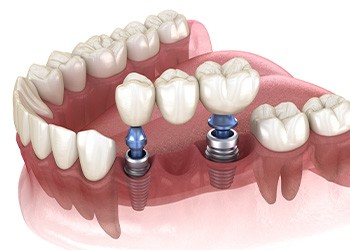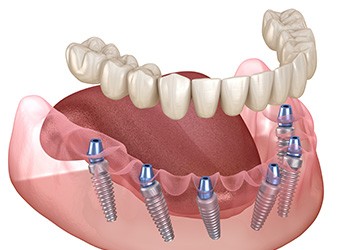Get Started?
Dental Implants Glastonbury
The Reality of a Permanent, Longer-Lasting Set of Teeth

Dental implants are unlike any other type of tooth replacement. Catching the attention of millions who have lost one or more teeth, these prosthetics deliver unparalleled results because of their root-to-crown replacement. Our dental experts at Glastonbury Dental Care are here to make the placement and restoration process easy and convenient by offering in-office treatment to patients suffering from tooth loss. If you are missing one or more teeth and would like to know more about dental implants in Glastonbury, contact our office to schedule an appointment.
Why Choose Glastonbury Dental Care for Dental Implants?
- In-House Dental Implant Placement & Restoration
- Dental Insurance Benefits Maximized
- State-of-the-Art Technology & Facility
What are Dental Implants?

As small titanium posts that look like screws but mimic the function of natural tooth roots, dental implants do what dentures and dental bridges cannot – restore the portions of teeth beneath the gumline. Fusing with the jawbone and its surrounding tissues, dental implants form a foundation for what eventually becomes a complete smile. Capable of supporting a dental crown, bridge, or denture, each restoration is secured to the implant posts for a more permanent, longer-lasting smile.
The 4-Step Dental Implant Process

Dental implants offer a permanent solution for missing teeth, restoring both function and aesthetics. Our streamlined process is designed for efficiency, comfort, and optimal results. From your initial consultation to the placement of your final restoration, every stage of your treatment is handled in-house by our skilled team. Whether you’re missing one tooth or several, dental implants can transform your smile and confidence. Read on to learn what to expect on your journey!
Initial Dental Implant Consultation

First, you’ll have a comprehensive consultation with a member of our team. During this appointment, we will evaluate your oral health using advanced imaging to determine if you’re a candidate for dental implants. You may be advised to undergo preliminary procedures such as bone grafting or tooth extractions if necessary. This step ensures your mouth is fully prepared for implant surgery. We will also walk you through the entire process and answer any questions you have, helping you feel informed and confident before moving forward.
Dental Implant Surgery

Once you’re cleared for treatment, you’ll undergo implant surgery right here in our office. There’s no need to visit an outside specialist! We begin by administering local anesthesia to ensure your comfort. Then, our skilled dental professionals precisely place the implant posts into your jawbone. These serve as the sturdy foundation for your future restorations. Because all procedures are done in-house, we maintain full control over quality and care from start to finish.
Dental Implant Osseointegration & Abutment Placement

After surgery, your implants will need several months to heal and fuse with the jawbone through a process called osseointegration. This crucial step ensures the stability and longevity of your implants. Once healing is complete, we will attach small metal connectors called abutments to the top of your implants. These abutments will later support your final restoration. After this procedure, a short healing period of about two weeks is needed before proceeding to the last phase.
Delivery of Dental Implant Restorations

The final phase of your implant journey involves placing your custom-made restoration. Whether you’re receiving a crown, bridge, or denture, each restoration is crafted to match your natural teeth in shape, size, and color. We securely attach the restoration to your implant abutments, restoring full function and aesthetics. This final step completes your smile transformation. You’ll leave with natural-looking teeth that can last a lifetime with proper care.
Benefits of Dental Implants

With over a half-million dental implants placed each year, these life-changing prosthetics have quickly become one of the most popular ways to replace missing teeth. Thanks to their unique placement inside the jawbone, this modern tooth loss solution provides a wide range of important benefits you simply won’t get with other options like dentures or dental bridges. Dental implants don’t just replace your teeth: they have the potential to dramatically improve your confidence, health, and your quality of life.
Day-to-Day Benefits

Dental implants provide myriad benefits that you can enjoy in your daily life, including:
- The ability to once again chew all your favorite foods.
- Dental implants are easier to keep clean by brushing and flossing than dentures or dental bridges.
- The ability to smile confidently knowing that your new teeth both look and feel lifelike and will never slip out of place at an embarrassing moment.
Health Benefits

In addition to their cosmetic benefits, dental implants also offer many benefits to your oral and overall health, such as:
- Helping to maintain a strong, healthy jawbone.
- Supporting surrounding teeth.
- Allowing you to eat a nutritious diet and reducing your risk of malnutrition.
- Not causing tooth sensitivity or gum sores like dentures and dental bridges can.
- Easier care means better oral health and a lower risk of overall health problems.
Long-Term Benefits

Finally, the long-term benefits of your new dental implants are undeniable. These include:
- A 95% success rate, even 10 years after placement.
- Your prosthetics won’t need to be replaced like other restorations such as dental bridges or dentures.
- Only needing to pay for your treatment once will potentially save you a lot of time and money when compared to other restoration options.
Who Dental Implants Can Help

No matter how many went missing, losing permanent teeth makes it much harder to perform daily tasks that once felt like second nature. You might develop issues eating, speaking, or smiling confidently without a complete set. Thankfully, our team at Glastonbury Dental Care can provide a versatile solution with dental implants that can be adapted to meet your unique needs.
Although potentially anyone can receive one of these resilient restorations, that doesn’t mean they’re the best treatment for everyone. Continue reading to learn more about who benefits the most from dental implants, and feel free to contact us with additional questions.
Who Is a Good Candidate for Dental Implants?

Because dental implants involve a surgical procedure, you must consult with one of our dentists to ensure you’re a valid candidate before you can move forward. We’ll look for the following traits to verify whether additional treatments are required to ensure you can support your prosthetics:
- Good overall health: We will update your medical history to ensure your body can safely undergo the procedure.
- Commitment to oral health: Cavities and gum disease can lead to implant failure and must be cleared up before proceeding.
- Sufficient jawbone density. Your jaw provides the foundation for your teeth, so it needs to be thick and strong enough to support them.
If you can’t get implants right away, don’t worry! Additional treatments, like fillings or a bone graft, are sometimes necessary first.
Missing One Tooth

If you’ve lost a single tooth, it can be seamlessly replaced with a dental implant capped with a crown. Because your jawbone fuses with the titanium rod used as a support, this is a sturdier and more resilient option than a dental bridge, which requires that some enamel be removed from healthy teeth to serve as an anchor.
These sturdy standalone structures can last for decades if cared for correctly, meaning it can potentially be with you for the rest of your natural lifespan.
Missing Multiple Teeth

Patients who are missing several teeth in a row can combine the strength of dental implants with the versatility of dental bridges to fill the gap in their grins. Instead of inserting one titanium pole, our team will place two- one on each side of the space in your smile. Then, we’ll provide a lifelike restoration with the correct number of artificial teeth to replace the missing ones.
Missing All Teeth

Some people assume that dental implants aren’t a practical way to replace an entire mouth of teeth, but that’s not always true! Many times, 4 to 6 rods can be strategically embedded to support a full set of dentures. This is an excellent solution for those who struggle regularly with poorly fitting prosthetics that slip out of their mouths at inopportune times.

Get Started?
